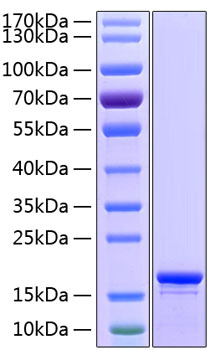Description
Recombinant Human Stathmin/STMN1 Protein
The Recombinant Human Stathmin/STMN1 Protein is a biologically active recombinant protein that plays a significant role in various cellular processes and signaling pathways in human biology. This protein is widely employed in immunological research, cell biology studies, protein-protein interaction analyses, and therapeutic development, providing researchers with a reliable tool for investigating Stathmin/STMN1 function and its implications in health and disease.
This product (SKU: RPCB1389) is produced using E. coli and features a C-His tag for convenient detection and purification. The protein exhibits a calculated molecular weight of 18.37 kDa with an observed molecular weight of 20 kDa under denaturing conditions, achieving ≥ 95 % as determined by SDS-PAGE., ensuring exceptional quality and consistency for research applications.
Key Features
| High Purity by Affinity Chromatography | |
| Mammalian & Bacterial Expression Systems | |
| High lot-to-lot consistency via strict QC |
| Product Name: | Recombinant Human Stathmin/STMN1 Protein |
| SKU: | RPCB1389 |
| Size: | 10 μg , 50 μg |
| Reactivity: | Human |
| Synonyms: | C1orf215, LAP18, Lag, OP18, PP17, PP19, PR22, SMN, STMN1, LAP18, Lag, OP18, PP17, PP19, PR22, SMN, stathmin |
| Tag: | C-His |
| Expression Host: | E. coli |
| Calculated MW: | 18.37 kDa |
| Observed MW: | 20 kDa |
| Gene ID: | 3925 |
| Protein Description: | High quality, high purity and low endotoxin recombinant Recombinant Human Stathmin/STMN1 Protein (RPCB1389), tested reactivity in E. coli and has been validated in SDS-PAGE.100% guaranteed. |
| Endotoxin: | < 1 EU/μg of the protein by LAL method. |
| Purity: | ≥ 95 % as determined by SDS-PAGE. |
| Formulation: | Lyophilized from a 0.2 μm filtered solution of 20mM PB, 150mM NaCl, pH 7.4.Contact us for customized product form or formulation. |
| Reconstitution: | Centrifuge the tube before opening. Reconstitute to a concentration of 0.1-0.5 mg/mL in sterile distilled water. Avoid vortex or vigorously pipetting the protein. For long term storage, it is recommended to add a carrier protein or stablizer (e.g. 0.1% BSA, 5% HSA, 10% FBS or 5% Trehalose), and aliquot the reconstituted protein solution to minimize free-thaw cycles. |
| Storage: | Store at -20℃.Store the lyophilized protein at -20℃ to -80 ℃ up to 1 year from the date of receipt. After reconstitution, the protein solution is stable at -20℃ for 3 months, at 2-8℃ for up to 1 week. |
Stathmin (STMN1) is a ubiquitous cytosolic phosphoprotein which belongs to the Stathmin family. STMN1 is expressed in many tissues, with the highest expression in the brain, spinal cord, and cerebellum. It can also be expressed in the colon, ovary, placenta, uterus, and trachea. STMN1 participates in the regulation of the microtubule filament structure by destabilizing microtubules. STMN1 promotes the disassembly of microtubules and prevents assembly. STMN1 is involved in the control of the learned and innate fear. STMN1 is an intracellular relay integrating regulatory signals of the cellular environment and as an Oncoprotein in regulation of the cell cycle. Phosphorylation at Ser-16 may be required for axon formation during neurogenesis. Mutation in STMN1 effects cell homeostasis that may lead to tumorigenicity.







